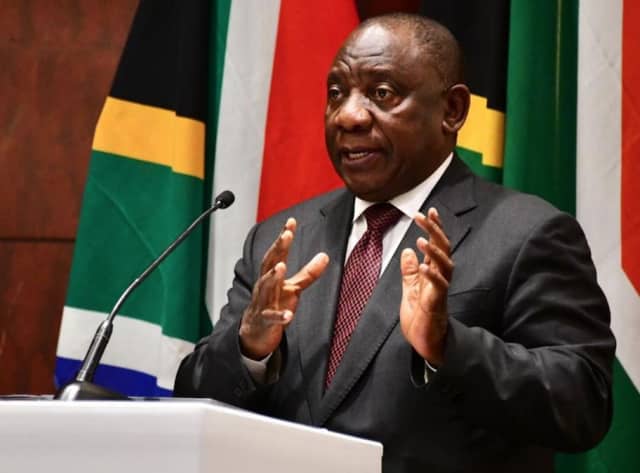SA Government has established a partnership with business to work together in four critical areas, including energy, logistics, crime and corruption, and employment to give impetus to efforts currently being undertaken.
President Cyril Ramaphosa said this while delivering an address to the nation updating on the Economic Recovery progress on Monday.
“We continue to collaborate with organised labour and civil society to ensure a whole-of-society approach to addressing the most important challenges our country faces. All of this gives us hope that we are turning the tide on the many challenges that we face,” the President said.
This month marks three years since government embarked on the Economic Reconstruction and Recovery Plan, which outlined the actions that it would take to rebuild the economy and create jobs in the wake of the COVID pandemic.
The President acknowledged that the last three years have been extremely challenging, as the country emerges from more than a decade of stagnant economic growth, compounded by the impact of the pandemic.
“We are working to reverse the legacy of the past era of corruption and mismanagement of our State-owned enterprises, which has left us with a persistent energy crisis and an inefficient ports and rail network.
“And we are contending with a range of global and domestic pressures which have set back our economic recovery. And yet, there are clear signs that our efforts are showing results. Electricity supply is improving. Jobs are being created.
“Houses, roads, bridges and dams are under construction. Law enforcement agencies are cracking down on criminal syndicates. The proceeds of State capture are being recovered. These are reasons for hope,” President Ramaphosa said.
Since then, in the midst of severe load shedding and increased global volatility, he highlighted that the economy has continued growing, albeit too slowly. He added that the economy has shown a significant degree of resilience and is now larger than it was before the pandemic.
Reforms – Energy Action Plan
Turning to one of the main challenges in the country, President Ramaphosa told the nation that progress is being made towards ending load shedding.
“We are making progress towards ending load shedding. Our greatest priority has been to reduce the severity and frequency of load shedding to achieve energy security. Over the last few months, there has been a measurable decline in the severity of load shedding,” the President said.
He noted that the Energy Action Plan he announced in July last year is showing positive results, “giving us greater confidence that we will bring load shedding to an end”.
The President said that regulatory reforms that have been initiated have enabled a massive increase in private investment in electricity generation, with over 12 000MW of confirmed projects in development.
Following the introduction of tax incentives and financing mechanisms, he said that the amount of installed rooftop solar has more than doubled to over 4 500MW in the last year.
“The steady progress we are making in resolving the energy crisis is a reason for hope,” he said.
Infrastructure
Another commitment made in the Reconstruction and Recovery Plan was to fix South Africa’s infrastructure through renewed investment in maintenance and construction of new projects.
The President highlighted that several significant infrastructure projects are underway.
“These projects are both contributing to greater economic activity and jobs, and providing much-needed infrastructure for the growth of our economy and the needs of our people.
“These infrastructure projects range from social housing, road construction, rural bridges, and dam constructions,” he said.
President Ramaphosa further highlighted that the Passenger Rail Agency of South Africa has to date restored operations on 26 out of 40 commuter rail corridors.
To continue with the restoration of the country’s commuter rail corridors, he said R50 billion will be spent over the next three years to modernise the passenger rail network.
As part of the infrastructure build, the President said that the sixth administration is undertaking significant water infrastructure projects. These include Phase II of the Lesotho Highlands Water Project and the Mzimvubu water project in the Eastern Cape, which will involve an investment of R17 billion.
“Around the country, water treatment works are being upgraded, pumping stations are being repaired, and pipes are being laid to get water to under-serviced areas,” he noted.
Logistics system
President Ramaphosa said the country is making progress in restoring its logistics system to world-class standards, so that SA can export goods to global markets.
The National Logistics Crisis Committee is overseeing a range of interventions to stabilise and improve the performance of the logistics system in the short term, in addition to ongoing reform to improve its efficiency and competitiveness in the long term.
He said the Transnet board has developed a turnaround plan, which aims to increase volumes transported on SA’s network.
“Progress is also being made with the introduction of private sector participation in container terminals. I want to make it clear that South Africa’s port, rail and electricity infrastructure are strategic national assets, and that they will remain in public ownership.
“However, introducing competition in operations – both in electricity and logistics – will create greater efficiency and reduce prices in the long term, just as the introduction of competition in the telecommunications sector has led to greater choice and enormous benefits for consumers,” he said. – SAnews.gov.za
